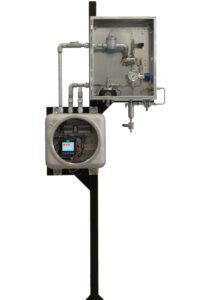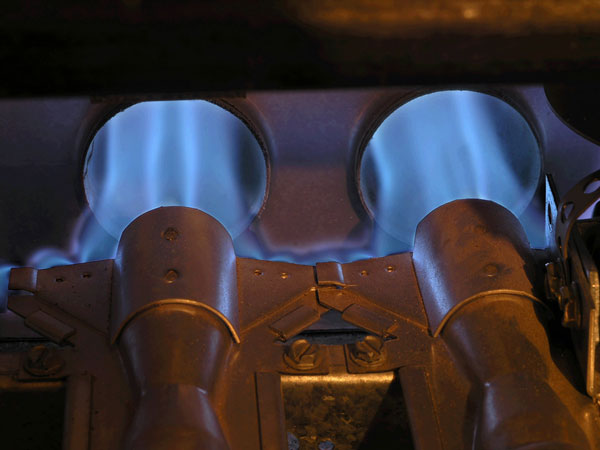Not everyone has at their disposal natural gas leak detectors, but most people with normal senses are capable of detecting a gas leak. First and foremost, if you suspect a gas leak is present, do not ignite a match, lighter, or any flame source. Resist from switching electrical switches, or turning lights on or off. Evacuate the area, get to a safe place, and call 911.
Our senses of sight, sound, and smell can provide clues if there is a gas leak in the area. Also, you may feel physical symptoms. How can you detect a gas leak without a detector? Use your senses.
 Use your Senses to Detect if a Gas Leak is Present
Use your Senses to Detect if a Gas Leak is Present
How do you feel?
Gas leaks reduce the amount of oxygen available to breathe. As you breathe in less oxygen, you may start to develop symptoms. If you experience sudden and unexplained indicators, there could be a gas leak in your home. Symptoms could present as headache, dizziness, nausea, eye and throat irritation, fatigue, breathing issues, pale skin, or blisters, which occur if the skin comes in contact with compressed or liquid gas.
Visual Signs of a Gas Leak
There are many visible indicators of a gas leak. Some are obvious like an exposed gas line that may have unearthed in a disaster, like an earthquake, a flood, or fire. Another visible cue may be an explosion or fire near a pipeline. Some less apparent signals include seeing dust or debris, a cloud, perhaps even water being blown in the air, or noticing a broken connection to an appliance fueled by natural gas. Possibly, there may be a dry patch of grass on your lawn, as gas displaces the oxygen in the roots of vegetation, and in standing water, there may be bubbles in the water. In the house, unexplained dead plants or higher than usual gas bills could clue you in.
Evidence by Sound
Another indication that you may have a gas leak is through the sense of hearing. If you are near a gas line or a gas appliance and hear whistling, hissing, or perhaps even a roar, it can be an indication that there is a leak.
Rotten Egg Smell
The most notable indication that there is a natural gas leak present is the smell of a sulfur-like compound, similar to a rotten egg smell. While many say that this is natural gas, the truth is that it is the odorant injected into the gas to make it detectable, as natural gas is odorless. This odorant is the first line of defense against a gas leak. Gas odorization is mandated by federal regulation to add a specific level of odorant into gas in distribution and some transmission lines to warn people of the presence of gas.
When Odorized Gas Fails

The GPL 750 odorizer provides precise odorization, even in low-volume (even no-flow) and intermittent-volume conditions, reducing the risk of odor fade.
While odorized gas is usually the first warning system for gas, there are times when odorized gas won’t be detected. While you may have an interest in our article, “Why Can’t I Smell Natural Gas,” here are three reasons odorized natural gas may not be detected by smell:
- Not all people have the same smell ability, and the regulations dictate the level of the odorant to be perceptible to those with a “normal sense of smell.” Some people with colds or allergies can experience hyposmia, a diminished sense of smell. Others on medications, or use alcohol, or tobacco may also have hyposmia, while there are those with anosmia, who cannot smell at all.
- Odor fatigue is also a diminished capability to smell from prolonged exposure to a substance.
- A physical or chemical activity that may cause the odorant loss, making the gas undetectable by the nose, is called odor fade. Everyday situations causing this phenomenon may include when new pipe material is installed, which is why gas pipe pickling is performed on brand-new lines. Also, odorized gas may not be detectable when the odorant injection system is unable to odorize accurately at low flow, and intermittent flow applications. Lastly, odor fade may occur when there is the presence of various substances in the gas, such as mill scale, moisture, air, cutting oil, pipe thread compound, liquids, and condensates.






Yeah, I agree that we can detect a gas leak by using our senses. Thanks for sharing an informative post.
There’s been a weird smell coming inside my house lately, and I’m worried that it might be a gas leak. Thanks for letting us know that the most notable sign of gas leaks is the smell of something similar to sulfur in the air. I’ll have to contact gas leak repair services as soon as possible.
Thank you for explaining what kind of sound you can hear that indicates a gas leak. Our neighbors had a gas leak this past weekend, and it made me wonder how we would tell if it happened to us. I’ll be sure to remember this in case it does happen.
Hello, thank you for the content. keep sharing
You made an interesting point when you mentioned that odorized gas is usually the first warning system for gas. As far as I know, there are some gases that don’t have odors such as Radon. It seems like it would be important to have some kind of alarm system installed in your building or home to make sure that radon leaks can be detected.